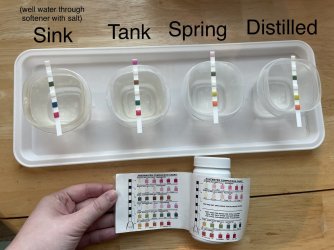I’m new to aquariums (aside from the betta that I somehow managed to keep alive for several years as a kid). I’ve had a 20 gallon tank set up for about 5 months now, not counting the time I let it cycle. The original stocking was 1 betta, 4 dalmatian mollies, 3 pepper corys, and 2 mystery snails. Of those, the only ones still alive is one of the mollies (though they had 3 babies that managed to survive, so it’s still 4 total) and two of the corys. I am on my 5th and 6th snails right now. Previous ones lasted anywhere from under a week to over 4 months. I also have two java ferns in there that I planted at the beginning.
I have a Fluval U2 filter and a heater set to 77°F. There’s a pair of little pumps wrapped in foam (sort of like filters) that send water to plant beds above the tank that then pour the water back in the tank. I do a 25% water change every weekend including vacuuming the gravel. I’ve also added some cuttlebone for the snails.
So my big question is: How is it that I kept a betta for at least 3 years in a 2 gallon tank, no heater or filter, that got cleaned with *soap* every other month but this tank has been nothing but a struggle?
Could it be my water softener? With the betta, there wasn’t a water softener so he was getting my straight, VERY hard well water. Now I have a water softener. It’s not my area of expertise but I know it uses a lot of salt (or some other kind of sodium). I looked at a few other threads asking about water softeners and saw very mixed opinions ranging from “very bad” to “makes no difference.” I decided to try refilling my tank with spring water when I do water changes. After 2 weeks and about 10 gallons of bottled spring water (half the tank), I saw no major changes on my test strips other than more nitrates.
Now I’ve decided to do a little experiment and test different water sources side by side. I’m not sure if my softener has a bypass or not, so I didn’t test that. The test strips are Tetra 6-in-1 EasyStrips. See the attached picture for the comparison.
So for more specific questions:
1. Are sodium-based water softeners safe for aquarium use, especially with snails? If yes, how should I add calcium and magnesium back into the water and how much? If no, what should I use instead? If my softener has a way to bypass it, would the (very) hard water be better or worse?
2. How is GH controlled? How can my tank water be over 100 ppm higher than the sink and spring water that has gone into it?
3. How can I lower KH and pH other than with liquid chemicals, which I’ve already tried?
I’m determined to get this right, so please give me any advice.
I have a Fluval U2 filter and a heater set to 77°F. There’s a pair of little pumps wrapped in foam (sort of like filters) that send water to plant beds above the tank that then pour the water back in the tank. I do a 25% water change every weekend including vacuuming the gravel. I’ve also added some cuttlebone for the snails.
So my big question is: How is it that I kept a betta for at least 3 years in a 2 gallon tank, no heater or filter, that got cleaned with *soap* every other month but this tank has been nothing but a struggle?
Could it be my water softener? With the betta, there wasn’t a water softener so he was getting my straight, VERY hard well water. Now I have a water softener. It’s not my area of expertise but I know it uses a lot of salt (or some other kind of sodium). I looked at a few other threads asking about water softeners and saw very mixed opinions ranging from “very bad” to “makes no difference.” I decided to try refilling my tank with spring water when I do water changes. After 2 weeks and about 10 gallons of bottled spring water (half the tank), I saw no major changes on my test strips other than more nitrates.
Now I’ve decided to do a little experiment and test different water sources side by side. I’m not sure if my softener has a bypass or not, so I didn’t test that. The test strips are Tetra 6-in-1 EasyStrips. See the attached picture for the comparison.
So for more specific questions:
1. Are sodium-based water softeners safe for aquarium use, especially with snails? If yes, how should I add calcium and magnesium back into the water and how much? If no, what should I use instead? If my softener has a way to bypass it, would the (very) hard water be better or worse?
2. How is GH controlled? How can my tank water be over 100 ppm higher than the sink and spring water that has gone into it?
3. How can I lower KH and pH other than with liquid chemicals, which I’ve already tried?
I’m determined to get this right, so please give me any advice.


